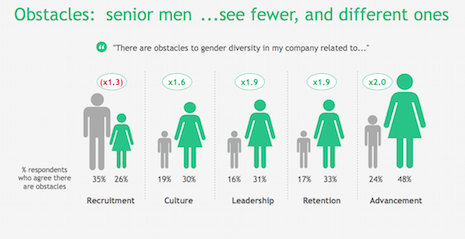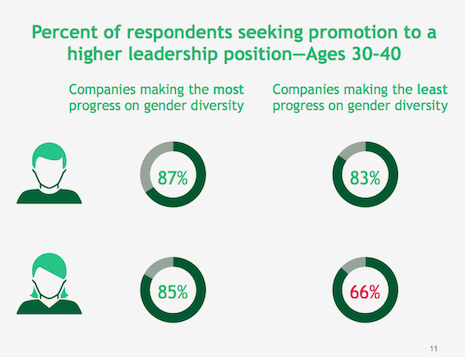NEW YORK – While most companies have a gender diversity program of some sort in place, far fewer women feel that those programs are having a genuine effect on how they advance through a company.
Speaking at the Women in Luxury conference on Sept. 26, a principal from Boston Consulting Group laid out some of the ways that companies can support their own women employees and not just their women customers. Advancement and retention, it turns out, are far more important for this than simply hiring more women.
"Women are not shattering the glass ceiling," said Katie Abouzahr, principal and Global Women@BCG fellow, Boston Consulting Group. "There are more CEOs named John then there are CEOs who are women.
"People talk about shattering the glass ceiling, but its more about a broken ladder," she said. "In the United States there are more women than men in college but the ratio reverses as you go up the business ladder."
Luxury Daily produced the Women in Luxury conference on September 26.
Advancement and retention
While much of the Women in Luxury conference focused on women customers and the personal experiences of women in the luxury world, Ms. Abouzahr’s talk laid out some clear data on the reality of women in the workplace and how companies can treat them better.
One of the key things Ms. Abouzahr spoke about is the disparity between what men think is the biggest obstacle for women and what women think it is.
When asked, most men said that recruitment was the hardest thing, meaning that, as a woman, initially getting the job you want is the most difficult part of a career.
But for women, the two things they chose as most difficult were retention and advancement. Essentially, it’s not hiring women that is the problem, it is keeping them and ensuring they are able to advance through the company.

Men misidentify major obstacles for women. Image credit: BCG
Ms. Abouzahr attributes this to a few things. One is unconscious, or worse, conscious bias on the part of men who run businesses against promoting women into larger roles.
Additionally, a lack of sensitivity to women’s needs, such as adequate maternity leave and role models, causes many women to quit jobs they are unhappy in rather than staying and advancing.
While men, as the dominant force in much of the business world, have a responsibility to be supportive of women and help them get the equal treatment they deserve, Ms. Abouzahr still emphasizes that women need to speak up and ask for the things they want.
"Don't wait around for some CEO to fix everything," Ms. Abouzahr said. "Take accountability and own it and drive it yourself.
"Don’t ask, don’t get," she said. "Ask someone to be your sponsor, ask for what you want."
Next steps
Making these changes happen takes more than just cursory gestures towards equality.
BCG conducted a survey in which 91 percent of companies said they had some sort of gender diversity program in place. While this number should be celebrated, only 27 percent of women said that they personally benefitted from one such program.
This number is consistent with the experience of women in other industries as well.
For instance, female consumers control around 30 percent of the world’s wealth, and yet many financial services companies do little to focus specifically on their women clientele (see story).

Ambition is not the issue. Image credit: BCG
BCG's Ms. Abouzahr stresses that treating women well is not just the morally right thing to do, it is also just good business.
"Approach this like you’d approach any other major change," Ms. Abouzahr said. "This isn’t just an HR thing.
"This is a big deal. This is a potential 6 percent increase in profit margins," she said.
"Build a case for the change and set goals. Relentlessly track those goals and refine your approach in order to meet it better."
{"ct":"n+jXOWNx7e1qofE7lrptBqE6\/YBBr3m9AaBnQRbUXJaT6ws4f+0ozDOKsxXcVn+RTWrUJWkfUJaDq\/MZsu2xxLxN+BhO1LtlJGta7rrLDdLE0UfJmNMYpvU9rCIZQS41SuxW8OtdJyOWWSltKMdmDsICzMmNN8bO5T\/sisFPgg+vUSOaTVqgSLKKHT3iGtGFdrQ9Su5XE6nd7NtbDGnZv\/NlpTLmyrbcLBcNoTzSG8UdM\/Kxg1RM9KwgjFOjevjgiQyGQ3XsbBpB\/3GtQ6whuBSTwYJXXer\/XtvQYPc1\/RvhRMr3iRGRCwm2LmmMYl24qBodN+RbqNg+mZTg25SxlkITleJtFG0x5W90hRLTcPLbN9BeZtaJOU4HQxNEGL1sdBo07PmG6snLKB+lI+S+lybP2xBP2M2sJOhe20ddtaonhq\/BFKUB2HwmhvSJq2vArkviGopE1JjIpma7470n9YgHVNNhc7NhRiO\/WNP\/bnLe80xK1MvI6ETrCIdMuU7Kap+vg2iswIntIylMweATiOYlIaK7IOlAgySgS\/2tQ\/l57S0ELsqnJ3lfNsfVp21Lh770VPqcfmF5uxlYvrOR2FH\/IuoE3ijgqu4jlO2Htq63ory\/A6GxDmwqGa9iPI0h85LBDNuvZykfTDOTfQpqs68OXQrsWdOvIKZ3t7WsZhNmmBRPQ8AW5hs7MFHfdHD0\/4IcjnrBP5\/G0\/C\/l1zi2+NTYm2ItWYo1Koeb3Vh5BGEtyo6KqDyrdZJMBQslP+3ssEulhjQhgtipr\/qAkivBS7eRH\/cIH99Yl\/\/IBojTelZ0ccebPIGbKDSfwEz7iD0vV4kRsP9Eo2g5u6oNxdzfdBFOaCwvvm3UUWSLJ93gHqnOeJuPonIy228b2CLkYcU8wf7CRM9sbn0R+97tR+dl3JRvnxgc5sw3JwsZidWLas1N6k03psE4a2y21YmEd0w5Y9P6zEN7c0Uv94M6xhVyarZdiXlXT5necm\/7zjLDN7vLTqxYs\/4OXAKo\/foaJey8qiyjKDxCCrrwZ\/7k8LxsR1+90jPv1COe0I0TiyECJJRE2GIxMDjq6eyDgyRpnFvgBsrH7x9jYoEMyso2c9nOZ0C2ekPmCL1iyFmnj1gbrIXcmUsVclPyCMFa7x8J1AsL4LUgpkoIQ8mNwkvAerADXcBxHFqYMxkhrX3ggSLYuDbeTXOSdBe1MNOsRPcsAqNoaM8xWfV+gU\/U1sEKzNRcSwKXFyfwDY25Kz1uya6DTzgn4VGbCbwChkooSf2\/No5oR6USVbZQtn2+RsBTR3bU3sR7xspAKIfiLJBni7jOg5mebwkuK2sbOOK2kXw1mBip6\/15v28HfcmW01kAyPapC4kkpsJ\/bZ6IZGmlK3TH42u3WNk3tfY365OMgZiRX7NSNAGzhbCQ5K22SWdei5i3yVx2R2BpN3n8bAsiARaNQcL6yqAmCsdLQUx4BOZI0GitKkwUNwgJ\/IO\/27cOKJiEteiBUFSZ0iIQQGJRmz5Q3yPx2DD439lti2upODtzU18ZWETVc5ihxCAqsjZPPoi9G9CXKsRv\/dZK2VOZbSYgnxm1nU15dmJHBfV\/n4zOu8vPGKwprarKYqxVZzSHlt2yjKIF10xBHEzWzEbJFvIX1iXQSe6zv9itmI2RyYOOyRFDyQVizGKf+bye\/CK+Enex9Xp\/WZb93DQy5yVt4EDCiRViginlBGf0tdFKWUu8ps7WfpVQ9S8TtjVIukWLrWakHeUl\/3jnk3gbzid7+Fh0V+R9YicPYzfFXCIsNr3bJ++TsRxBKOKroOKz26rVtVpy1pqU6smIhpAwcZuL8IslB6uLS\/Jr0VJDOoZGPvvZneLbc+LzRhErXLeCkfbCzxsNmVZSrUJT6HL85tYjZ7K9nO5fmZ+6Igt\/R0Rt1Q1Tw+bvC6kWXBtq6aj4HBLFi1tJVZYfqg+GaWjYg5xm2YrNXTRclF3PU\/cBVDxi8EsMWYJh2xctHRPR2BdkcNavhGMAvlKnclJaGGlfMnqwqTrqEs1brdE7hWpQuBmdlERiTFbT79Lf2V9pdgQw6J5jnHDTK3jmPToohqdKqjdkuM5Rb8Um7S\/kvwkyrTzisGRt2zKiGgtexZPtuc33epuIcOJCi95wC3nIxAnpHTzipHhIZyzRwQXgBFyxBaL4vkPuUgwCTsuaTBkZcPC0P55zSH3AnJSgkip0xPc3M3SuGmPupuz5r+PQ3RyZ\/3KBtnohRSBprECJCusBqHDXZ70Csv1qgT87Jc7E4lKcHVga9fwBd0\/K56+M7OP03l8049X9yzdlQzrBWQgHBjyp3LaraWqxVItFm2SPNLspmO17kQhYtDEn\/oFfmedbMSmbT6253dqBdqQCXc4EtHynZ1Xy5M9RIhWia9EoKl1\/cfqJcGom\/VioHruepoWhvJjvUiSRCXmogBOW1CUrUemhtTiTaAROhTAz6tW\/sk+AZ6ot7T3CUGkz5AmQOQupMhIr+BDP3Yo2MVnaeWDIX8g19EGTd9owx6bBg8KTddBEeIMgR4eQ9Q3pS3UMpD9c9M3XG5doSlwQIW+yTil\/CJBz3P6Uu7qsm7ED4OsotP6RkvDMlhWJ1UoRZdOZgyMtXveBIFQdcH0nJkUgOjTmGdUbbpAbNikm6mCABWVsGlA\/02FL5Nu1ThUX6xgqC+81X1QHEUspXM9+q1JAywg+pwCb8KhG\/nqYl\/8Ia+Ag7e7RlMpEnhRu1ulul7pcLO98ipnoA37c2BLVGa6JXo29Ydf\/SKYhwveyptW4FBmga5S2TXwtId30qGTJ2+zaWtiAjjmeBq0Woq6XRTfY8mDZScP3JCzE+Q2RA2pTwX\/76\/\/rafHhh81EKMsbU\/rt7JSbGk6kE1Z9TE6xFq3YOeRselm5vd7IU2Y0o3yClh+pVdtysP3CwwPx1sMSY7vzijibslEaQrLN73BfE\/auH0OWvL2DT6ZqN0R0z9nPh3ViuQRmwLCpZARln07I2L4OheSuwD8SMGVo42FLCoU9a5mfLwxHsonZTFygwZu85DuHQpYQ56bOqnUhyS\/8WMBgVVkkgxfvIqMu8LdnV4rL6KjOqooZx3VIuKiRtxemxQmcRp52F3DMv4KqiEeZ9KwgxtA9IiLR\/794x2\/aKhyILNXPHYUE09oAXUkx\/qVobKmMTIzv\/RC0h6ZMqMLq21zcLhoP4zAI2JQ3plxIgd2GMLccLd4Urh8GytwSE+GuMenYDoee5G9wtjY6O\/4Q+nWUeWwNolrNqF11qi9pgNkoK7NFqlwH8dBH25cYjrQrhFylBzV3Sz8T6qUqjXZ8wzxUuvofLwktrnqQiM8NJsP\/HJ62U+UmlTxpcZ1BHkgqFcGBs41zKgz+5Kqv4sO4udLOObUbt\/0be2kzYkZufESa8mvaCbwl000UOgCspomkAolE0uGmb+oa\/WxUzGqwGIHEnH0aSfxBqaXnKgafEfNqAQ64wCRT8tdjZtlpO\/QbIO8+VDp7lBg02U5+g5X5QIpdKg+gDjvoTHTNP4vGzgEBvz55K2dlAkf8af3areWE9no0rZojA8zLsOvbKUuShPWlf+vi4ISU7c5JczyZqlLkh9XPD+xJym0fvB1sTi9r3MMNqqLfWLaM1aQZSuiBTBtolJN26bUY4E5rtQRPFzfByRESeJ2DhHPyFVDgRUxsWowqAupT\/PympW5qorYbPEIkmXhUALN8Vp5lSpzLMCafDRRGbwWYUMAv6j0eBK8UZV3qf4mVAfqxjXiimE36njwHFDiS6SGGOhZQApSSx4Z9eTS0H00N+WvfdIWuanTEtcUpnojLgAsm+tpthX1xNk24Q887J\/wAFUMFv\/8wi8DIfvG2BYjI4BTgqJNxgjUkx0qcIdhr4Gy\/Lwz7pb4SbfrZwLCxp8ykRH9Ok5beQcSWJlcES3ABUYwsbIHO607OkkwCwxakk9aE2MweHIlMqYgUwJpVnICjERemh\/PydHf1y2XbWGIQxlG4HmRGOH+iQF+aE1zmbjBJffb5xSN2oImzM7qY48zRnCWDxh6ySvw0Oqmgq8pZFvkVdDyeqd5Fdqk55L27SH5g5V6vWVXzLa0bd\/k09msbpv6KW7RhG\/WwQQLje5quylJd5+vLlWVlrZJPxHAA61YqdN7NRmwL8h4lqiJfX5ef6O9WCpvkku5yYRXivdRMEgogTCCih+6L3xe8WAT5OVqsh3WPV7\/jaKmY00uAPlT5C\/BXIH92+veglG5aockYwanW06IhsCYu6tEx3qOCiKMclK+RYyO+vPMgArFCI4HFKb9I7z6Bxy4jpNd0n5lXDQbMo2S0qDfr1lh1AA9JeIJp1PSPIan+e4+kNFeEea7+837WJ+P53yzvYEYHFq+0QJLkOO\/IEPNA7l4Slr9OV0xn3rRfG1HQD+YirqjibBBFkTzjUAfzb2SZKRmpBz7bSx3BchpZDbmR0P7mfShXaQi0KsGRKsUjrqEXAFtkjIp7bLOEx1QS3WSkKdgxRfAYsFWiQaZJ8JmjVK0BGmwy73apS6DTrvg+MI1\/D8AgqKT8Q82RJPOPxSMDeAyN8WTu022k9odvPpVvD4b0CT4hgDCwCLxNDlft5d1Qe6hxJ00Lca0cmdHyV66KaZ2woky7gOf5ZJmSOtz6Si5Rkv83nua7ABoh9\/ofY07a09FpPSnLukXJVqmnsbf1fTI5KT8Xwg5rwvbxSLPIXL9JR2HcdyAtD\/yJbvgXbml3QY1Go78Z1JQek1Tl+WuOFCSgVSktXNG3LyqqNSCh3fceN9d+0E6S5\/Fux2FhyCUAIgD64ZsKQy+VGhERyb0853Hgo201OeBej3e5zPf+ep209OtxlRjX2u0cEU5rRArL75oxllcNgq6UPwj3mxZH8c1KSiTk4P9Y4a7ZhZbymi1ihtvc9OejZjPy6wwe\/zNAhYyvFbl\/vQ8Jg1VNkwtKbhHbFC2wx5+nY2ibhbPAw9Ry9YahMqAtSTE586fbw\/\/XnYW3K\/IfplOZhvC6ZLN8YiJnOajzjABD\/rrHFqIswIBNxxCs+0MEkRbeOzxrxIdHNZssRBLjmvuXEYggVDKslcLSmVsg1ha1BYoJuZDSHDzgHkSwRNraJToYJ2Dj5KNhk\/kmw3SPJdZ9lV8YBRnuMcw5g+BQafOaND+YyhBxwcVjdvjVvZoZwZNnVEemz7idxJ\/kb5dVtj9Ah7X9aDnwJ+bxAyjyAOptDBzlf+VqzuxOIOAtmA+\/T+pbEiGs7+xS0o+MvwPiVIxR19tqZyTELr5MQ8DbVUPLrlHlrNlvK6XGmpJIjQzjrhTiKB4xwoMK2Xl2agilUfChB\/eQNRrWYj9N7t1nZV99DIF2VE0Q7wnV9YClcDg7cpWnss7Dvr4aquZJKGeKaLymCvWI9kBUMo52RMGxf5FDOVTg2qlpoEYBXpZwdTvKs+13tl1CFVhv2p6WO8zQGrRnP2fwXCD1R6Rf9GpbEbYiuZC9Hkw9H096HxQY9dt29Rnqq6hxNOvW98hQ68Z\/3Tc+HbKw7RwAlCcPZsDDrW3AHoC6f+uSkk4hijc66u6e0yEdJycbpdOSuPbfwQWFcG6512yH2Xr9qqtk53LKmtZrMyM+lTPR4eeq+1ZwuJjPBEnSt376+bxW0nZz1QOxUGpUodbshJtQtddPtzT7kXxqqktPqi+MbQjRDkOHRcdAwY\/DVTbdR90OSZVRfJodQVXIYrqjJY\/nAs9clRedwst7qqWlpeMmUKFJQgFOwfLVMnhRVyYBMeYetWZvrWGBvwy9aA+NoqZ7qqDcCL2aHzsUipLt8xNPPURsN9ZCdO4s789plTQd4ALrsSIet+fwq43KK7\/NNZklyFYzAKsV3P8rcmtY+mk3Mk2YHijhQj6c4AE3V4OTQG2lc2cZoDFGfwvsARdFJrbv2t5USgQW5fPfWLpyNlf65\/CKRT6SdhCjtGojrTV0caVSLfYJB2hqdrA+3XHf9WdoY9wSEd9\/LbwOyhLzoP7oPxistmS09sjNBGfNo5KFQanA2oOI8ORANG55\/YvFUJSAf3LxBHu0Xp6e4fk5Dpl5aPF90lWniVmFSgpcGt\/FrUHEQl0ZtOyAfGabkXO+pz\/WYOJeekzHoZ4XvYJmX0Cm106TaKv2f7TdR1zcerl\/RRsHDFLE3XA6SpSOlOyaQchT73lJ9HxKQnOpeLf\/PO8cNNvMkpcfNYlWuN5plpX7ElnXkyTLSaLBJnv4I1amQKdkB1au\/BtF5aptiFBA0ylqNC4XYJhLol3RGDzYd3hz6nrA3MBqY0jIqB4ieLvXh6F+b69ECo6LtFFCFq9EEXUS1DDqYD+gGPXowBY+qAwzH5gY5K2ztQ9243cdffrGTTog61Mre7+6gDjdy+JmSlznfQcciKzmylgmVJeXx8CCeNz7v3PkwYnlxuHcyZDQBQbg6N4hva\/09LkcELsMqks\/veJvqFDv7ULLMn7ie8CUyxGZ3RTsulayJS2dauhc15iuAUQXbnbuLmOBfTLDz4wwYhVNvDjUHOV0RFq+3XeF9eZUI3oZ2JxDVJTImLKupmB+EcRcLR+d0G4Bh8Qsahlos9tCZT1YPhQureReQohuvsa04VsWCT487Vf5Ayw6LyFLNczyExIYh+8woToOMu1KtZ7zGC1kXRgPLItIqVyI5RVKfUFbURw+8u\/q2ToTnOEjpDJiVlGq0bTiuykucox4WerxL6HvlgQFYR7MF5nucfo4f9+8PDO6KWrENpxhYEuG5KRTwTYVsoSR3XL+tEMlpr9m\/neyJRvD6rXFZrBp5jHesZ0pTt5BCPCXLE96Fk9cpIKDnr2CNPJHlSFf\/uBtCT7tL32RMZRWjboa7WRFCT6\/jtC32Tqfyo2KiUEp5BNq0WgcfGSddaK+fA9kJQrdtoLHqv9QH3vrWbI5MFyJbnxbTYqYGQ1LCakF108X+jvzyx16ntdnwlU2nlKTbMmNrarD\/qxTCy718nX+1D+Y5y94MgRgMfR1oCfkStN","iv":"a7fcd95c6b746fde5bfca619e3c303d0","s":"0e2e772dedc4b784"}

 The biggest issue women face is the ability to advance through the ranks at a company. Image credit: BCG
The biggest issue women face is the ability to advance through the ranks at a company. Image credit: BCG